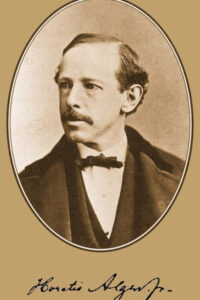
Jack’s Ward
It may be remarked that our story opens in the year 1867, memorable for its panic, and the business depression which followed. Nearly every branch of industry suffered, and thousands of men were thrown out of work and utterly unable to find employment. Among them was Timothy Harding, the father of our hero. He was a sober, steady man and industrious, but his wages had never been large, and he had been unable to save up a reserve fund on which to draw in time of need. He had an excellent wife, and but one child—our present hero; but there was another, and by no means unimportant member of the family. This was Rachel Harding, a spinster of melancholy temperament, who belonged to that unhappy class who are always prophesying evil, and expecting the worst. She had been “disappointed” in early life, and this had something to do with her gloomy views, but probably she was somewhat inclined by nature to despondency.
The family lived in a humble tenement, which, however, was neatly kept, and would have been a cheerful home but for the gloomy presence of Aunt Rachel, who, since her brother had been thrown out of employment, was gloomier than ever.
But all this while we have left Jack and the stranger standing in the street.
“You seem to be a good boy,” said the latter, “and, under the circumstances, I will pay you more than I intended.”
He drew from his vest pocket a dollar bill and handed it to Jack.
“What! Is all this for me?” asked Jack, joyfully.
“Yes, on the condition that you carry it home, and give it to your mother.”
“That I will, sir; she’ll be glad enough to get it.”
“Well, goodbye, my boy. I hope your father finds work soon.”
“He’s a trump!” ejaculated Jack. “Wasn’t it lucky I was here just as he wanted a boy to hold his horse? I wonder what Aunt Rachel will have to say to that? Very likely she’ll say the bill is bad.”
Jack made the best of his way home. It was already late in the afternoon, and he knew he would be expected. It was with a lighter heart than usual that he bent his steps homeward, for he knew that the dollar would be heartily welcome.
Read or download Book
Jr. Alger Horatio
Horatio Alger Jr. (January 13, 1832 – July 18, 1899) was an American author who wrote young adult novels about impoverished boys and their rise from humble backgrounds to middle-class security and comfort through good works.
Biography.
His writings were characterized by the “rags-to-riches” narrative, which had a formative effect on the United States from 1868 through to his death in 1899.
Alger secured his literary niche in 1868 with the publication of his fourth book, Ragged Dick, the story of a poor bootblack’s rise to middle-class respectability. This novel was a huge success. His many books that followed were essentially variations on Ragged Dick and featured stock characters: the valiant, hardworking, honest youth; the noble mysterious stranger; the snobbish youth; and the evil, greedy squire. In the 1870s, Alger’s fiction was growing stale. His publisher suggested he tour the Western United States for fresh material to incorporate into his fiction. Alger took a trip to California, but the trip had little effect on his writing: he remained mired in the staid theme of “poor boy makes good”. The backdrops of these novels, however, became the Western United States, rather than the urban environments of the Northeastern United States.
Biography
Childhood: 1832–1847
Alger was born on January 13, 1832, in the New England coastal town of Chelsea, Massachusetts, the son of Horatio Alger Sr., a Unitarian minister, and Olive Augusta Fenno. He had many connections with the New England Puritan aristocracy of the early 19th century. He was the descendant of Pilgrim Fathers Robert Cushman, Thomas Cushman, and William Bassett. He was also the descendant of Sylvanus Lazell, a Minuteman and brigadier general in the War of 1812, and Edmund Lazell, a member of the Constitutional Convention in 1788. Alger’s siblings Olive Augusta and James were born in 1833 and 1836, respectively. An invalid sister, Annie, was born in 1840, and a brother, Francis, in 1842. Alger was a precocious boy afflicted with myopia and asthma, but Alger Sr. decided early that his eldest son would one day enter the ministry. To that end, Alger’s father tutored him in classical studies and allowed him to observe the responsibilities of ministering to parishioners. Alger began attending Chelsea Grammar School in 1842, but by December 1844 his father’s financial troubles had worsened considerably. In search of a better salary, he moved the family to Marlborough, Massachusetts, an agricultural town 25 miles west of Boston, where he was installed as pastor of the Second Congregational Society in January 1845 with a salary sufficient to meet his needs. Alger attended Gates Academy, a local preparatory school, and completed his studies at age 15. He published his earliest literary works in local newspapers.
Personal life
Scharnhorst writes that Alger “exercised a certain discretion in discussing his probable homosexuality” and was known to have mentioned his sexuality only once after the Brewster incident. In 1870, Henry James Sr. wrote that Alger “talks freely about his late insanity—which he appears to enjoy as a subject of conversation”. Although Alger was willing to speak to James, his sexuality was a closely guarded secret. According to Scharnhorst, Alger made veiled references to homosexuality in his boys’ books, and these references, Scharnhorst speculates, indicate Alger was “insecure with his sexual orientation”. Alger wrote, for example, that it was difficult to distinguish whether Tattered Tom was a boy or a girl, and in other instances, he introduces foppish, effeminate, lisping “stereotypical homosexuals” who are treated with scorn and pity by others. In Silas Snobden’s Office Boy, a kidnapped boy disguised as a girl is threatened with being sent to the “insane asylum” if he should reveal his actual sex. Scharnhorst believes Alger’s desire to atone for his “secret sin” may have “spurred him to identify his charitable acts of writing didactic books for boys with the acts of the charitable patrons in his books who wish to atone for a secret sin in their past by aiding the hero”. Scharnhorst points out that the patron in Try and Trust, for example, conceals a “sad secret” from which he is redeemed only after saving the hero’s life.
Alan Trachtenberg, in his introduction to the Signet Classic edition of Ragged Dick (1990), points out that Alger had tremendous sympathy for boys and discovered a calling for himself in the composition of boys’ books. “He learned to consult the boy in himself”, Trachtenberg writes, “to transmute and recast himself—his genteel culture, his liberal patrician sympathy for underdogs, his shaky economic status as an author, and not least, his dangerous erotic attraction to boys—into his juvenile fiction”. He observes that it is impossible to know whether Alger lived the life of a secret homosexual, “[b]ut there are hints that the male companionship he describes as a refuge from the streets—the cozy domestic arrangements between Dick and Fosdick, for example—may also be an erotic relationship”. Trachtenberg observes that nothing prurient occurs in Ragged Dick but believes the few instances in Alger’s work of two boys touching or a man and a boy touching “might arouse erotic wishes in readers prepared to entertain such fantasies”. Such images, Trachtenberg believes, may imply “a positive view of homoeroticism as an alternative way of life, of living by sympathy rather than aggression”. Trachtenberg concludes, “in Ragged Dick we see Alger plotting domestic romance, complete with a surrogate marriage of two homeless boys, as the setting for his formulaic metamorphosis of an outcast street boy into a self-respecting citizen”.






